Dedicating oneself to the profession body and soul in order to discover the most beautiful job in the world.
The protagonist of our new interview is Dr Miguel Rechichi, who tells us about the importance of a well-structured and articulated training course and, above all, of opening up to the world scientific community.
How did you choose your training in Ophthalmology and what is your current professional profile?
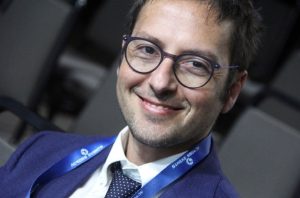
I am a private ophthalmologist, an anterior segment surgeon with a special interest in laser-assisted surgery and the treatment of keratoconus. I am the founder, together with my wife Melania, of Centro Polispecialistico Mediterraneo, an outpatient clinic with high specialisation in eye surgery. I have always had a great passion for computers, technology, photography and travelling. My parents, father an anaesthetist and mother a pulmonologist, passed on their love of medicine to me. As a child, I often spent a lot of time in the hospital while my parents were working, and my desire has always been to be a doctor to help people.
Until my fourth year of medical school, I had no clear idea of my future choices. Ophthalmology was a stroke of lightning for me, because it was the only branch that combined all my passions in one speciality: science, technology, optics. I started attending, as a volunteer even before entering the speciality, prestigious hospitals such as the Moorfield Eye Hospital of London. Too much desire to see and learn. During my specialty I spent my holidays abroad to hone my knowledge and surgical experience. I attended Prof Amar Agarwal's group for many years. After my specialty, I started working as a refractive surgeon at some affiliated clinics in Calabria, Italy, gaining great experience in the field of corneal cross-linking and excimer lasers. During those years, in 2009, together with my fraternal friend Cosimo Mazzotta, we started to develop accelerated cross-linking techniques, fine-tuning protocols and the machines of a well-known American company, today a market leader, which had entrusted us with this project. Since then it has been a journey of great satisfaction, which has led me to speak all over the world about these developments.
There are many people I have to thank, I had many mentors abroad such as Prof. Agarwal, Dr. Soosan Jacob, Dr. Nirav Patel, but I would especially like to thank Dr. Giovanni Spinelli who perfected me in cataract surgery from the height of his enormous experience by teaching me how to handle complex cases.
In the last three years I have realised my dream of founding a clinic, the Centro Polispecialistico Mediterraneo, where we manage eye diseases at 360 degrees, sharing experiences and collaborations with my colleagues, offering patients the best care and doing surgical training in the field and at a distance.
I also work as a consultant for complex refractive surgery and keratoconus cases for some private clinics in Sicily and Campania.
I continue to be a researcher out of passion, developing new technologies in the field together with Italian and foreign colleagues, both in academia and the private sector.
Can you tell us about an unusual or particularly complex clinical case that you managed to handle and solve?
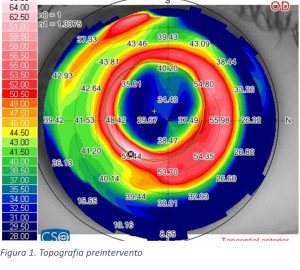 I remember a complex case handled a few years ago: a girl who had undergone PRK surgery at another site for a military competition. One eye had been fine, the other eye had had a major decentralisation, with a residual irregular astigmatism.
I remember a complex case handled a few years ago: a girl who had undergone PRK surgery at another site for a military competition. One eye had been fine, the other eye had had a major decentralisation, with a residual irregular astigmatism.
The patient was further retreated with a non-customised treatment, the final outcome of which was a severe haze that rendered the cornea further irregular and the defect incorrigible (Fig. 1).
The patient was obviously in despair and the possibility of a cornea transplant had been put forward.
The patient was referred to me by a colleague to see if there was any margin for recovery before a possible transplant.
After 3 months of anti-inflammatory therapy with dexamethasone eye drops and a galenic preparation of Losartan, the inflammation and haze picture had clearly improved, 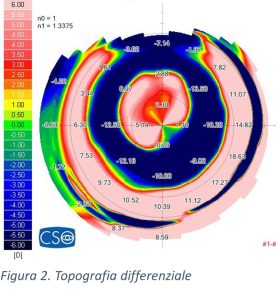 but a pronounced unevenness and haze remained.
but a pronounced unevenness and haze remained.
I therefore decided to design a topoguided treatment in order to restore a more physiological corneal profile.
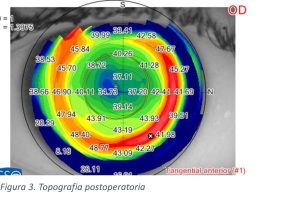 The treatment was a great success, restoring a very regular profile with a residual refractive defect of less than one myopia of hypermetropia, which allowed the patient to participate and pass the competition in which she had been unable to participate the year before.
The treatment was a great success, restoring a very regular profile with a residual refractive defect of less than one myopia of hypermetropia, which allowed the patient to participate and pass the competition in which she had been unable to participate the year before.
When the patient returned after passing the competition she was moved and it was a very emotional moment for both of them.
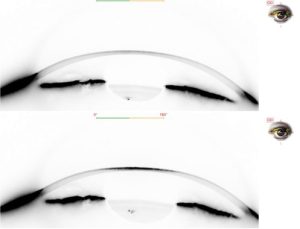
A few tips for young colleagues starting out in Ophthalmology.
'Stay Hungry. Stay Foolish'.I quote a sentence from Steve Jobs' famous speech to the students of Stanford University, which represents my entire life and work journey.
When you decide to do this job, devote body and soul because you will have great satisfaction, but also disappointments that only passion will help you overcome brilliantly. Use your time constructively and always be critical of yourself and have the courage to follow your intuitions, never being afraid to fail.
Hang out with constructive colleagues and people who leave room for your ideas without stifling them, and always be grateful to those who have given you the opportunity to grow.
One last piece of advice, open up to the world!!! There is only one world scientific community.
You will find different ways of working take what you think is valid and transfer it into your daily practice.
Only then will you realise that over time you have chosen to do the most beautiful job in the world!!!
Under the heading "I tell you a story..."
- "The more I like doing something..." - Italian ophthalmologist
Interview with Dr Silvio Zagari - 'Give a woman the appropriate opportunities and...' - Italian Ophthalmologist
Interview with Dr Manuela D'Aquino - Every clinical case: an opportunity for growth - Oculista Italiano
Interview with Dr Marco Zagari - The 'allologist' is a thing of the past - Oculista Italiano
Interview with Dr Francesco Cerbella - Broadening our views - Oculista Italiano
Interview with Dr Pasquale Napolitano - Basic skills in each subspeciality - Oculista Italiano
Interview with Dr Beatrice Tombolini - Let your heart lead you too - Oculista Italiano
Interview with Dr Danilo Mazzacane - The privilege of caring for people - Oculista Italiano
Interview with Dr Giovanni Scandura - "Travelling a lot to learn... - Oculista Italiano
Interview with Dr Federica Fossataro - The best refractive solution for each individual patient - Oculista Italiano
Interview Dr. Antonio Randazzo
Editorial info
Our column is open to all ophthalmologists who are interested in telling their colleagues and our web audience about a clinical case.
We invite anyone wishing to participate in our publishing project to contact
Editorial Board 'l'Oculista italiano' - Ada Puglisi
Tel. +39 095 79.22.145
E-mail: info@oculistaitaliano.it
Or write to us using one of our contact forms
Information Request - Italian Ophthalmologist
Collaborate with us - Oculista Italiano
On refractive surgery and corneal cross-linking:
- Biometrics and the success of refractive cataract surgery - Oculista Italiano
- Clinical practice: application of corneal cross-linking in the treatment of infective keratitis - Oculista Italiano
